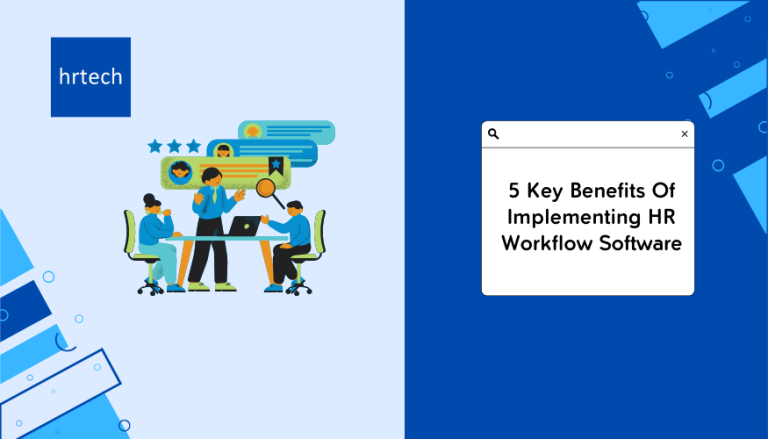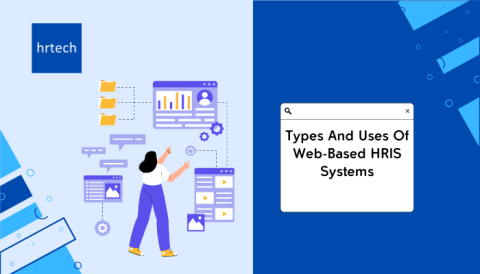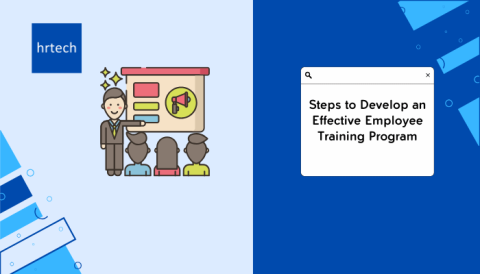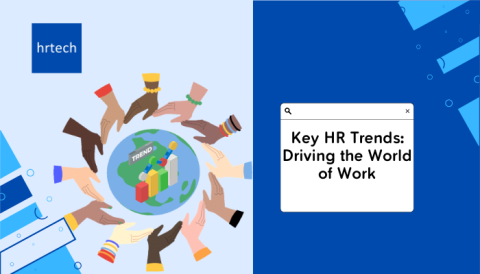The current HR landscape is rapidly evolving, with technologies playing a crucial role in modernizing the HR processes. One such technology is HR workflow software, which has become important in streamlining and automating various HR tasks. In this blog post, we will explore the five key benefits of implementing HR workflow software in your organization.
The HR landscape is undergoing significant changes, with a growing emphasis on digital transformation and automation. HR teams are now expected to handle a wide range of tasks, from recruitment and onboarding to performance management and employee engagement. This has led to an increased need for efficient and effective HR processes.
Role Of Technology In Modern HR:
Technology has become a game-changer in the HR sector, enabling organizations to automate repetitive tasks, improve communication, and enhance employee experiences. HR workflow software is one such technology that has gained popularity in recent years, offering numerous benefits for HR teams.
HR workflow software is a digital tool that helps organizations manage and automate various HR processes, such as onboarding, performance management, and leave management. By implementing HR workflow software, organizations can improve productivity, reduce errors, and enhance collaboration, ultimately leading to better accountability and employee satisfaction.
What Is HR Workflow Software?
Define HR workflow software:
HR workflow software is a digital tool designed to set up and monitor a defined set of HR tasks and their sequence. It helps in automating and streamlining various HR processes, such as onboarding, performance management, and leave management.
Explanation Of How It Works:
HR workflow software operates by automating the execution of a series of HR activities to complete a business process. It can be customized through a set of configuration tools and is scalable and flexible to accommodate various HR processes. There are different types of workflows, including process workflow, case workflow, and project workflow, each focusing on the execution of a series of activities or tasks.
Different Types Of HR Workflow Software:
There are various HR workflow softwares available, and they can also be made to fulfill the needs of an organization. Some examples of HR workflow software include Kissflow HR Cloud, ServiceNow HR workflow automation, and other workplace management software that provide a single platform to automate, monitor, and manage all HR-related workflows. These systems are becoming increasingly important in the modern human resources management software, offering benefits such as process definition, increased control over processes, and efficiency.
The 5 Key Benefits Of Implementing HR Workflow Software:
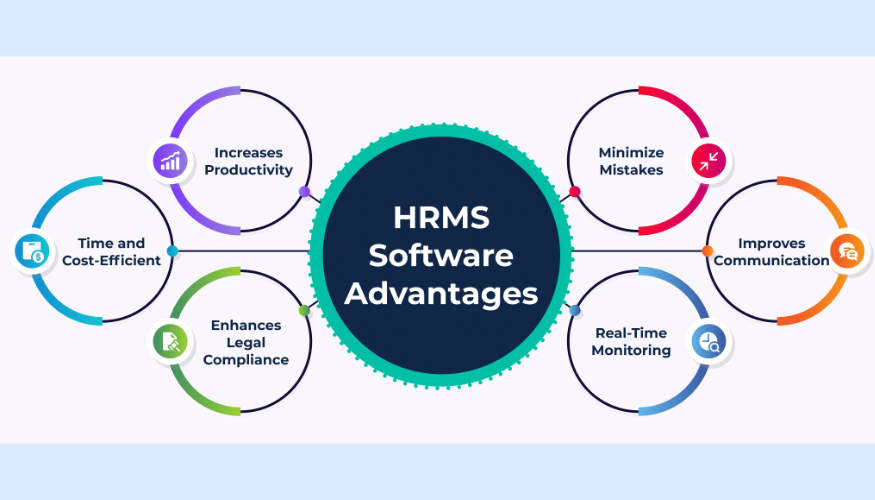
1. Increased Efficiency
Explanation of how HR workflow software increases efficiency:
HR workflow software increases efficiency by automating and streamlining various HR processes, such as onboarding, performance management, and leave management. It reduces the need for manual intervention, saving time and effort, and allowing HR teams to focus on other essential business needs. The software also optimizes the whole workflow, making it more efficient and productive.
2. Enhanced Compliance
Explanation of how HR workflow software aids in maintaining regulatory compliance:
HR workflow software aids in maintaining regulatory compliance by ensuring that HR processes are consistent, transparent, and auditable. It helps organizations comply with various labor laws, regulations, and policies by automating compliance checks and approvals. The software also maintains a centralized database of employee information, making it easier to track and report on compliance.
Importance Of Compliance In HR:
Compliance is critical in HR as it helps organizations avoid legal and financial risks. Non-compliance can lead to penalties, lawsuits, and reputational damage. HR workflow software helps organizations stay compliant by automating compliance checks and approvals, reducing the risk of errors and omissions.
3. Improved Accuracy:
How HR workflow software reduces human errors:
It reduces human errors by automating repetitive tasks, such as data entry and approvals. It ensures that all HR processes are consistent, transparent, and auditable, reducing the risk of errors and omissions. The software also maintains a centralized database of employee information, making it easier to track and report on accuracy.
Potential risks associated with manual errors:
Manual errors can lead to delays, inefficiencies, and inaccuracies in HR processes. They can also lead to legal and financial risks, such as non-compliance with labor laws and regulations. HR workflow software helps organizations reduce the risk of manual errors by automating repetitive tasks and ensuring consistency and accuracy in HR processes.
4. Streamlined Communication
How the software helps in seamless communication between HR and employees:
HR workflow software helps in seamless communication between the HR and employees by providing a centralized platform for communication and collaboration. It enables HR teams to communicate with employees in real-time, share information, and provide feedback. The software also automates notifications and reminders, ensuring that employees are informed and engaged throughout the HR process.
The importance of effective communication in HR:
Effective communication is critical in HR as it helps organizations build trust, engagement, and loyalty among employees. It also helps in resolving conflicts, providing feedback, and improving employee experiences. HR workflow software helps organizations improve communication by providing a centralized platform for communication and collaboration, automating notifications and reminders, and ensuring that employees are informed and engaged throughout the HR process.
5. Better Employee Experience:
Role of HR workflow in improving employee satisfaction:
HR workflow software plays a crucial role in improving employee satisfaction by automating and streamlining various HR processes, such as onboarding, performance management, and leave management. It reduces the need for manual intervention, saving time and effort, and allowing HR teams to focus on other essential business needs. The software also optimizes the whole workflow, making it more efficient and productive, leading to better employee experiences.
Impact of employee satisfaction on overall organizational performance:
Employee satisfaction is critical to overall organizational performance, as it leads to higher productivity, engagement, and retention rates. HR workflow software helps organizations improve employee satisfaction by automating and streamlining various HR processes, reducing the need for manual intervention, and providing a centralized platform for communication and collaboration.
How To Choose The Right HR Workflow Software:
Choosing the right HR workflow software is crucial for organizations to streamline and automate various HR processes. Here are some key features to look for and considerations to keep in mind when selecting software that suits your company’s needs:
Key features to look for in HR workflow software:
- Automation of HR processes, such as onboarding, performance management, and leave management.
- Centralized database of employee information for easy tracking and reporting.
- Seamless communication between HR and employees.
- Compliance with labor laws and regulations.
- Integration with other HR systems, such as payroll and benefits administration.
- Customizable workflows to accommodate unique organizational needs.
Considerations when choosing software that suits the company’s needs:
- The size and complexity of your organization: Choose software that can scale and adapt to your organization’s growth.
- The specific HR processes you want to automate: Ensure the software can handle the processes you need to streamline.
- User-friendliness and ease of implementation: The software should be easy to use and implement, with minimal disruption to your HR team.
- Cost: Consider the cost of the software, including any additional fees for features or support.
- Vendor reputation and support: Choose a vendor with a good reputation and reliable support to ensure a smooth implementation and maintenance of the software.
By carefully evaluating these factors, you can find the right HR workflow software that meets your organization’s unique needs and helps you achieve increased efficiency, enhanced compliance, improved accuracy, streamlined communication, and better employee experiences.
Conclusion:
By embracing digital transformation in HR, organizations can automate and streamline various HR processes, saving time and effort, and allowing HR teams to focus on other essential business needs.We encourage the readers to consider adopting HR workflow software that suits their company’s needs. When choosing the right software, look for key features such as automation of HR processes, centralized database of employee information, seamless communication, compliance with labor laws and regulations, integration with other HR systems, and customizable workflows.
Considerations when choosing software should include the size and complexity of the organization, specific HR processes to automate, user-friendliness and ease of implementation, cost, and vendor reputation and support. We invite readers to explore the various HR workflow software options available and try out HRtech to experience the benefits firsthand.
